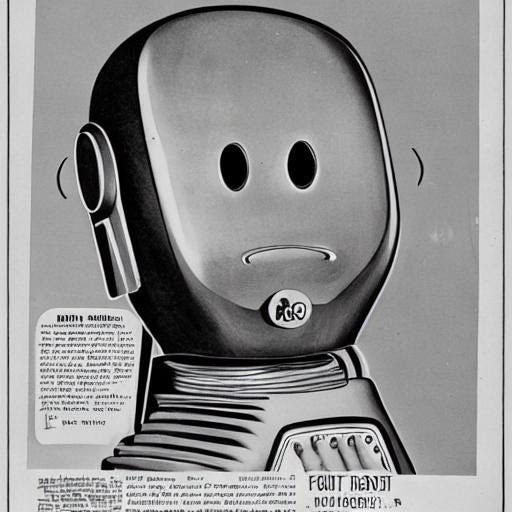Winston Cho at the Hollywood Reporter wrote that “AI-Created Art Isn’t Copyrightable,” in what I consider to be a story far larger and more significant than the rest of the media seems to think. Two days later I have not seen the story picked up.
https://www.hollywoodreporter.com/business/business-news/ai-works-not-copyrightable-studios-1235570316/
According to Cho, “A federal judge on Friday upheld a finding from the U.S. Copyright Office that a piece of art created by AI is not open to protection.”
In an earlier post I explained how literary agents and magazine editors are starting to receive (and possibly become inundated by) AI-generated stories and even novels. If those stories were created by AI (a phrase we need to linger on for a moment), they are not — according to this ruling — protected by copyright. If they are not protected by copyright, the person submitting those stories was not the author. If the stories have no author, anyone can do anything they want with them and they certainly don’t have to credit anyone or pay for it.
What does it mean to say something was “created by AI”?
Again, according to Cho: “The push for protection of works created by AI has been spearheaded by Thaler, chief executive of neural network firm Imagination Engines. In 2018, he listed an AI system, the Creativity Machine, as the sole creator of an artwork called A Recent Entrance to Paradise, which was described as “autonomously created by a computer algorithm running on a machine.”
In this case, Thaler defined the artwork as having been solely created by AI. By doing so, he removed the need for the court to ask philosophical questions about what “created” means or ask what the relationship was between the person and the AI system. This is significant because “The Copyright Office denied the application on the grounds that ‘the nexus between the human mind and creative expression’ is a crucial element of protection.”
Thaler himself said there wasn’t any nexus and so the court was able to uphold its position that “Human authorship is a bedrock requirement” of copyright.
Already this has huge potential implications on billions and billions and billions of dollars worth of creative work because:
• The video game industry now commands greater revenues than TV, film, and books COMBINED. If they were hoping to use AI for world-building, dialogue, (etc), and they cannot demonstrate a nexus been human minds and creative expression, their work cannot be copyrighted. No copyright means no intellectual property protection, which means no business model.
• This goes too for film and TV. If they were hoping to cut out the actors and writers (et. al.), their products cannot be legally protected and therefore they have no business model.
Perhaps most importantly, it also sets an agenda because it sets a criterion: If autonomy is not protected, and there needs to be a nexus been the human mind and creative expression,” then all future AI productions will be claimed to be a product of such a nexus and we will start to see an immediate shift in language from people claiming that art was “AI-generated” to something else, such as “AI-assisted,” or “AI-expressed.” Someone will land on the next legally-savvy term soon.
That ruling (assuming it is picked up and enforced elsewhere) also sets an agenda: What is the next between AI and creative expressive? What constitutes autonomously AI generated material vs a meaningful human-AI interaction? If the law demands AI-human interaction, the agenda of innovation will move towards co-creation rather than substitution, and tools for creation will all claim to assist human endeavors rather than replace them.
Which may also be a flat-out lie, but that’s another matter.
Last point for now: Law is situated in jurisdictions. There is state law and federal law. There is law in Japan and Egypt and Peru. These laws are not the same. Eventually organizations like the World Intellectual Property Organization in Geneva and The World Trade Organization will need to get involved in these matters, but when it comes to creativity, speech, ideas, and law, the future just ain’t what it used to be.




